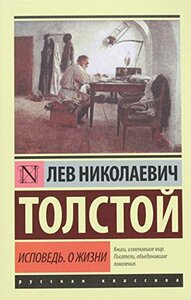Take a photo of a barcode or cover
Original Rating: 4 stars
Updated Rating: 5 stars. ⭐
I recently converted to Buddhism, after spending most of my life as an atheist — years of stubbornly believing there was nothing beyond what I could see or prove.
When I first finished A Confession, I thought Tolstoy was simply trying to cope with his existential crisis and had turned to Christianity because it was the only place he could find meaning. Honestly, I found it a bit silly at first — that someone with his level of intellect would resort to religion.
But the more I sat with it, the more I realized he was right all along.
I’ve been lost too, and I’ve experienced nearly everything he describes — only I’m still young (turning 22). I believed I was too “smart” to ever put my faith in a religion or higher power. But I was dead wrong.
I still don’t believe in a God, much like Tolstoy didn’t blindly accept everything Christianity taught. But I’ve come to understand that there is meaning to be found.
For me, that meaning came through Buddhism. For Marcus Aurelius, it was found in this world — in nature, in the Logos.
You don’t have to believe in anything specific. It’s okay to be an atheist. I’m not here to preach a religion — truthfully, I don’t even know what I’m preaching. I’m still lost, still figuring things out.
But one thing I’ve learned is: I am not the center of the universe. None of us are.
I don’t have the answers, and no religion holds them all either. But sometimes, believing in something — whatever that may be — helps you carry on.
Updated Rating: 5 stars. ⭐
I recently converted to Buddhism, after spending most of my life as an atheist — years of stubbornly believing there was nothing beyond what I could see or prove.
When I first finished A Confession, I thought Tolstoy was simply trying to cope with his existential crisis and had turned to Christianity because it was the only place he could find meaning. Honestly, I found it a bit silly at first — that someone with his level of intellect would resort to religion.
But the more I sat with it, the more I realized he was right all along.
I’ve been lost too, and I’ve experienced nearly everything he describes — only I’m still young (turning 22). I believed I was too “smart” to ever put my faith in a religion or higher power. But I was dead wrong.
I still don’t believe in a God, much like Tolstoy didn’t blindly accept everything Christianity taught. But I’ve come to understand that there is meaning to be found.
For me, that meaning came through Buddhism. For Marcus Aurelius, it was found in this world — in nature, in the Logos.
You don’t have to believe in anything specific. It’s okay to be an atheist. I’m not here to preach a religion — truthfully, I don’t even know what I’m preaching. I’m still lost, still figuring things out.
But one thing I’ve learned is: I am not the center of the universe. None of us are.
I don’t have the answers, and no religion holds them all either. But sometimes, believing in something — whatever that may be — helps you carry on.
challenging
emotional
hopeful
informative
inspiring
reflective
slow-paced
inspiring
reflective
fast-paced
Religious but makes you face biases you wouldn’t think of as a non-believer towards those who do
hopeful
informative
slow-paced
challenging
reflective
slow-paced
Tolstoy grapples with the point of life and takes us on his search for truth and meaning.
A heartfelt and touching essay written by a literary giant on the meaning of life. Tolstoy lays everything out for everyone to see, his thoughts on his mental struggles through every category and stage of life. The book ends on a very uplifting, and validating note. Even though he has found faults with the way people interact with religion and God, he continues to search, and does not forsake his faith. I’m now 2/2 on Tolstoy books making me cry.
This short, honest essay summarises the existential reflections Tolstoy went through when he turned 50. In particular, on absurdism and meaning, as well as the limitations of knowledge as a conduit for truth.
I read chapters 11 and 12 twice hoping to better understand the role he places on faith, a pivotal element throughout the rest of the book, only to find this connection somewhat weak and unsubstantiated. Please do let me know in case you read it and see it differently.
You might want to pair this reading with authors such as Camus, Dostojevski and probably Frankl.
I read chapters 11 and 12 twice hoping to better understand the role he places on faith, a pivotal element throughout the rest of the book, only to find this connection somewhat weak and unsubstantiated. Please do let me know in case you read it and see it differently.
You might want to pair this reading with authors such as Camus, Dostojevski and probably Frankl.
I feel funny rating a book by this profound author but there it is. Some thought provoking insights and biographical information about my favorite writer.
reflective
slow-paced
challenging
dark
emotional
hopeful
inspiring
mysterious
reflective






